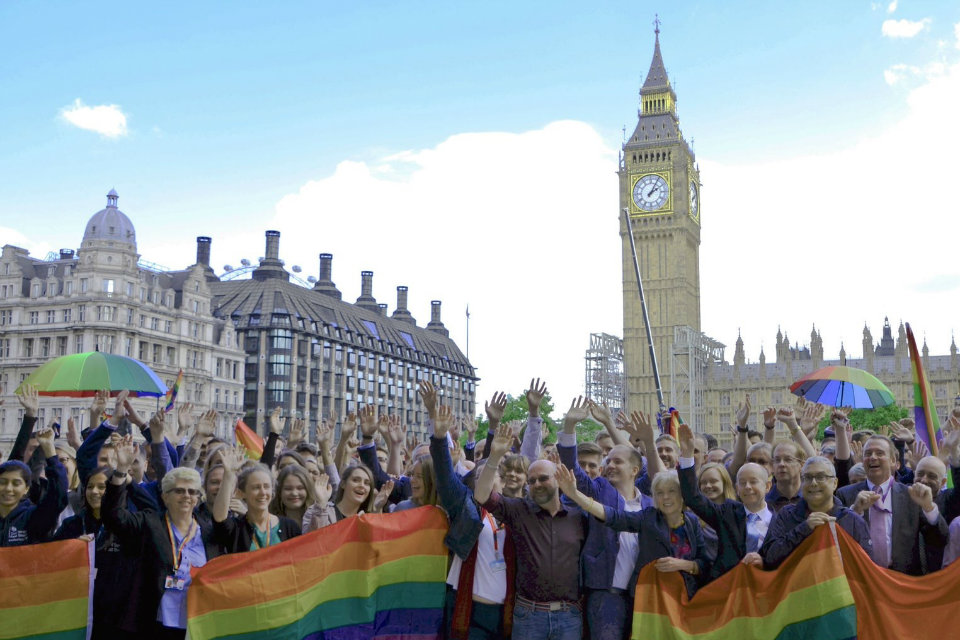
Looking back on LGBT History Month I want to use this opportunity to consider not only progress made, but also to ensure that we sustain a proactive support of LGB&TI inclusion across the Civil Service.
Becoming an ally
I wanted to be the straight ally of LGB&TI civil servants because it gave me the chance to help ensure that, someone’s sexual orientation or gender identity is not a barrier to being recognised for their skills, talent, and expertise. I want the Civil Service to be an inclusive place to work, one where we demonstrate the leadership and behaviours that enable people to choose to come out at work, in the knowledge they will continue to be treated with respect and valued.
Taking steps to be inclusive of all
Last year we published a new Civil Service Diversity and Inclusion Strategy. This focuses on our twin priorities of increasing representation – becoming an organisation where the diversity of the UK communities we serve is reflected at every level, and supporting greater inclusion – and creating a working environment where all people feel respected and valued for their talent and contributions. Both priorities are underpinned by a focus on driving greater accountability and assurance.
Better recording of LGB&TI inclusion remains a priority for the Civil Service. Otherwise, how can we know, for example, whether learning and career opportunities are equally accessible to our LGB&TI colleagues? Happily, our Future Leaders Scheme – a programme that identifies colleagues with the potential to progress to roles within the Senior Civil Service – has LGB&TI representation that is consistent with the proportion of staff at that grade.
We encourage participation in LGB&TI staff networks, including the Civil Service Rainbow Alliance and the cross-government network for transgender, intersex and non-binary staff a:gender. These networks continue to contribute to strategic activities and raise the profile of LGB&TI role models.
The challenges ahead
It’s clear that although we may have made some progress but we cannot be complacent. The 2017 British Social Attitudes Survey says that we there may a ‘societal shift’ towards more liberal attitudes but there are many areas where prejudice still persists. For example, the vast majority of people answering the survey (82%) describe themselves as “not prejudiced at all” to transgender people. However, less than half of respondents say suitably qualified transgender people should definitely be employed as police officers or primary school teachers (43% and 41% respectively). We know, too, that there have been recent transphobic campaigns run as the Gender Recognition Act is reviewed.
When looking within the Civil Service it is clear there is still more to be done. In 2017, 45% of civil servants reported their sexual identity, an increase from previous years but still far from where we could be, and this rate varies between departments. We must, therefore, remain steadfast in our commitment to inclusion so that we can tackle the pockets of prejudicial behaviours where they exist.
Looking forward
So it is a pleasure that against the stark headlines I can congratulate departments for demonstrating their commitment by participating in the 2018 Stonewall Index. The Index recognises employers who have done great work over the past year to help achieve acceptance without exception for LGB&TI people. I am delighted the list includes Welsh Government and the Ministry of Justice who have progressed to a top 20 ranking! The wider top 100 also includes the Home Office, Department for Education, Intellectual Property Office, the Crown Office and Procurator Fiscal Service, MI6 and the Environment Agency. I encourage departments to maintain this commitment and focus and continue to role model LGB&TI inclusion.
The Civil Service is unapologetically ambitious about our strategic commitments to accelerate our progress on LGB&Ti inclusion and achieve our ambition of becoming the UK’s most inclusive employer.


2 comments
Comment by Gavin Thomas posted on
Thank you Sue for a very good blog on a very important issue. Having been in the Organisation over 27 years, I have to say that I have a significant change in attitude in regards to Diversity and Inclusion within the Workplace.
Certainly within the FCO we have seen an increase in the number of Head of Mission overseas from both the LGBT+ and BAME Communities. The flying of the Rainbow flag has certainly helped to promote our message concerning equality.
I would very much agree with Kevin Oliver that particpation in Staff Groups that do not personally identify with yourself provides a a fantastic opportunity to meet some really interesting people. Through my involvement in both Wellbeing and as a Straight LGBT+ Ally I have to opportunity to meet Ruby Wax, Clarke Carlise and Mark Gatiss.
I have learnt much more about myself, the way that I behave towards others and the importance unacceptable behaviour / language.
Comment by Kevin Oliver posted on
Yet another extremely good blog.
It's important to "ally" yourself to groups you don't personally identify with. It makes you a better person.
I've been walking the inclusion path for many years, and it not only benefits the "Minorities" ( we're all minorities of one), but myself too.
I've made loads of genuine friends through getting involved with communities I don't at first identify with but soon find there's a lot of common ground.
We must not continue to work " in silos", but see ways of enpowering people to take thier rightful place in the communities in which we all live.